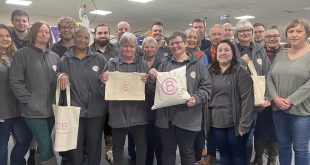Research by WRAP, the UK’s leading sustainability charity, found that more than half of people now view the environmental impact of clothing as severe, with two in three (63%) saying clothes made to look good and last longer are now factors in the brands and clothing they choose.
The findings build on earlier WRAP research which found that the public wants inventive new retail options that prolong the life of clothes, including voucher schemes for clothing exchanges (46%), and pre-loved clothes (41%) – particularly popular among younger and ‘high frequency’ (weekly) clothes shoppers. Personal habits have changed too during lockdown, with one in four (23%) now repairing clothes, and one in five (19%) keeping items for longer.
Businesses are responding to public demand for clothes with lighter environmental footprints, with major brands and retailers signed up to the SCAP 2020 voluntary agreement (Sustainable Clothing Action Plan) exceeding both the carbon and water targets. But, warns WRAP, many more aren’t, and those wanting to protect their market share must demonstrate to shoppers and shareholders their commitment to the environment, and sign up to Textiles 2030.
Marcus Gover, chief executive WRAP, said: “SCAP 2020 has been an amazing journey and so much has been achieved. I would like to thank signatories, advisors, supporters, funders and colleagues for their commitment and energy during these last eight years. I am hugely impressed by the extent to which we have been able to make such a difference by working together. SCAP 2020 signatories have been the recognised leaders. However, more action is needed by more companies to make clothing more sustainable. That is why we need to continue this work. Textiles 2030 will pick up the mantle.”
Textiles 2030 will be the most ambitious national voluntary agreement for clothing and other textiles in the world. The 10-year programme aims to transform UK clothing and home fabrics to reduce their impact on climate change. It will take the UK from a make-use-dispose culture to a circular one where goods are produced sustainably, used longer, and then re-used or recycled into new products. Central is the Target-Measure-Act approach, which requires clothing and textile businesses to set targets, measure their impact and track progress on both an individual business basis, and towards national targets and public reporting.
In this way, Textiles 2030 will reduce lifecycle GHG emissions in line with the global goal of a 1.5°C trajectory, cut the water footprint of products and deliver a UK-wide circular textiles road map.
Mr Gover added: “The climate emergency is intensifying, and our resources are limited. We need fast, effective action more than ever. Our research shows that people understand this, and want sustainable clothes not disposable fashion. Textiles 2030 is about transforming textiles, and taking up where SCAP 2020 left off – creating a fashion sector fit for the future.”
WRAP is also working with partners on a global approach to the clothing issue through the Circular Clothing Action Plan. Developed in partnership with the World Resources Institute (WRI) and supported by the Laudes Foundation, this project will deliver the first ‘off the peg’ plan to help achieve ambitious global circular economy targets on clothing by co-ordinated, national action. WRAP will develop the global goals and support their transition into national frameworks with measurable targets.
 Printwear & Promotion The Total Promotional Package
Printwear & Promotion The Total Promotional Package




